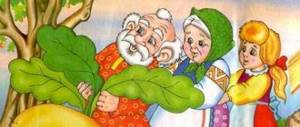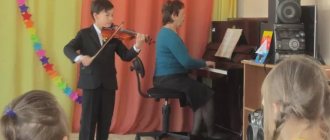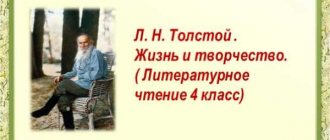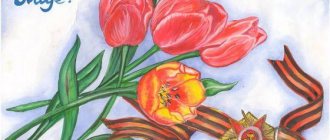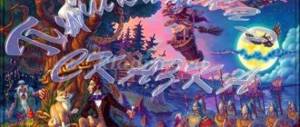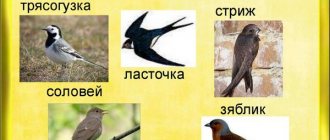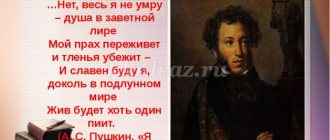Pushkin's poems for 3rd grade children
The easiest ones to learn are those poems where you don’t even need to memorize the rhyme - it just comes to mind. Pushkin has many such poems dedicated to descriptions of nature and conversations with friends. There are many excerpts from poems and fairy tales that have an independent meaning, and they can also be learned and told in class. Pushkin's poems for 3rd grade children are presented in this section.
Neater than fashionable parquet The river shines, dressed in ice. The joyful people of the boys cut the ice sonorously with their skates; The goose is heavy on red paws, Having decided to swim along the bosom of the waters, Steps carefully onto the ice, Slides and falls; The cheerful first snow flashes and curls, falling like stars onto the shore. *** The bird of God knows neither care nor labor; He does not laboriously build a long-lasting nest; In debt the night slumbers on a branch; The red sun will rise: The bird listens to the voice of God, perks up and sings. Behind spring, the beauty of nature, The sultry summer will pass - And the fog and bad weather The late autumn brings: People are bored, people are in grief; A bird flies to distant lands, to a warm land, beyond the blue sea, until spring. *** That year, the autumn weather Stood for a long time in the yard, Waiting for winter, waiting for nature. Snow fell only in January on the third night. Waking up early, Tatyana saw through the window a whitened courtyard in the morning, Curtains, roofs and a fence, Light patterns on the glass, Trees in winter silver, Forty merry ones in the yard And the softly covered mountains of Winter with a brilliant carpet. Everything is bright, everything is white all around. *** Already the sky was breathing in autumn, the sun was shining less often, the day was getting shorter, the mysterious canopy of the forests was revealed with a sad noise, fog lay on the fields, a caravan of noisy geese was stretching to the south: a rather boring time was approaching; It was already November outside the yard. *** It's a sad time! Ouch charm! Your farewell beauty is pleasant to me - I love the lush decay of nature, the forests dressed in crimson and gold, in their canopies the sound of the wind and fresh breath, and the skies are covered with wavy darkness, and the rare ray of sun, and the first frosts, and the distant threats of gray winter. *** There is a green oak near Lukomorye; The golden chain on that oak tree: Day and night, the learned cat keeps walking around on the chain; Goes to the right - starts a song, Goes to the left - tells a fairy tale. There are miracles there: a goblin wanders there, a mermaid sits on the branches; There on unknown paths are traces of unseen animals; There is a hut there on chicken legs. It stands without windows, without doors; There the forest and valley are full of visions; There, at dawn, the waves will rush onto the sandy and empty shore, And thirty beautiful knights emerge from the clear waters in succession, And with them is their sea uncle; There the prince casually Captures the formidable king; There in the clouds in front of the people, through the forests, across the seas, the sorcerer carries the hero; In the dungeon there the princess grieves, And the brown wolf serves her faithfully; There the stupa with Baba Yaga walks, wanders by itself, There King Kashchei withers over the gold; There is a Russian spirit there... it smells like Russia! And there I was, and I drank honey; I saw a green oak by the sea; He sat under it, and the learned cat told me his fairy tales. *** I erected a monument to myself, not made by hands, The people’s path to it will not be overgrown, He ascended higher with the head of the rebellious Alexandrian pillar.
No, all of me will not die - the soul in the treasured lyre will survive my ashes and flee decay - And I will be glorious as long as at least one drinker is alive in the sublunary world.
Rumors about me will spread throughout Great Rus', And every language that exists in it will call me, And the proud grandson of the Slavs, and the Finn, and the now wild Tungus, and the friend of the steppes Kalmyk.
And for a long time I will be so kind to the people, That I awakened good feelings with my lyre, That in my cruel age I glorified Freedom And called on mercy for the fallen.
By the command of God, O muse, be obedient, Without fear of insult, without demanding a crown, Accept praise and slander indifferently, And do not challenge a fool. *** I thought my heart had forgotten the ability to easily suffer, I said: what happened will never happen! it won't happen! Delights and sorrows passed, And gullible dreams... But again they trembled Before the powerful power of beauty. *** I loved you: love, perhaps, has not completely died out in my soul; But don't let it bother you anymore; I don't want to make you sad in any way. I loved you silently, hopelessly, sometimes with timidity, sometimes with jealousy; I loved you so sincerely, so tenderly, As God grant you to be loved differently. *** Frost and sun; wonderful day! You are still dozing, lovely friend - It’s time, beauty, wake up: Open your closed eyes towards the northern Aurora, appear as the star of the north!
In the evening, do you remember, the blizzard was angry, there was darkness in the cloudy sky; The moon, like a pale spot, turned yellow through the dark clouds, And you sat sad - And now... look out the window:
Under blue skies, Magnificent carpets, Glistening in the sun, the snow lies; The transparent forest alone turns black, And the spruce turns green through the frost, And the river glitters under the ice.
The whole room is illuminated with an amber shine. The flooded stove crackles with a cheerful sound. It's nice to think by the bed. But you know: shouldn’t we tell the brown filly to be banned from the sled?
Sliding through the morning snow, dear friend, let us indulge in the running of the impatient horse and visit the empty fields, the forests that were recently so dense, and the shore that is dear to me. *** In the depths of the Siberian ores, Maintain proud patience, Your sorrowful work and high aspiration will not be lost.
The sister faithful to misfortune, Hope in the dark dungeon Will awaken vigor and joy, The desired time will come:
Love and friendship will reach you through dark gates, just as my free voice reaches your convict holes.
Heavy shackles will fall, Prisons will collapse - and freedom will greet you joyfully at the entrance, And your brothers will give you the sword. *** Spring, spring, the time of love, How hard your appearance is for me, What a languid excitement In my soul, in my blood... How alien to the heart is pleasure... Everything that rejoices and shines Brings boredom and languor.
Give me the blizzard and blizzard And the long darkness of winter nights. *** Wind, wind! You are powerful, You drive flocks of clouds, You disturb the blue sea, You blow everywhere in the open air. You are not afraid of anyone except God alone. Al will you refuse me an answer? Have you seen a young princess anywhere in the world? I am her groom.” “Wait,” the wild wind answers, “There is a high mountain behind the quiet river, There is a deep hole in it; In that hole, in the sad darkness, a crystal coffin swings on chains between the pillars. No traces of anyone can be seen Around that empty place, In that coffin is your bride. *** *** The moon makes its way through the wavy fogs, It pours a sad light onto the sad meadows.
Along the winter, boring road, Three greyhounds are running, The monotonous bell is rattling tiresomely.
Something familiar is heard in the long songs of the coachman: Now daring revelry, Now heartfelt melancholy...
No fire, no black hut, wilderness and snow... Towards me Only striped miles come across one...
Boring, sad... Tomorrow, Nina, Tomorrow, returning to my dear one, I'll forget myself by the fireplace, I'll take a long look.
The hour hand will make its measured circle with a resounding sound, And, removing the annoying ones, Midnight will not separate us.
It’s sad, Nina: my path is boring, my driver has fallen silent from his doze, the bell is monotonous, the moon’s face is foggy. *** If life deceives you, Don’t be sad, don’t be angry! On the day of despondency, reconcile yourself: Believe, the day of joy will come.
The heart lives in the future; The present is sad: Everything is instant, everything will pass; Whatever happens will be nice. *** Love, hope, quiet glory The deception did not last long for us, Young fun disappeared, Like a dream, like the morning fog; But desire still burns within us, Under the yoke of the fatal power, With the impatient soul of the Fatherland, we heed the call. We wait with languid hope for the holy moment of freedom, Just as a young lover waits for the minute of a faithful meeting. While we are burning with freedom, While our hearts are alive for honor, My friend, let us dedicate our Souls to beautiful impulses to the fatherland! Comrade, believe: she will rise, the Star of captivating happiness, Russia will rise from her sleep, And on the ruins of autocracy They will write our names! *** The gods have still given you Golden days, golden nights, And languid maidens have their attentive eyes fixed on you. Play, sing, O friends! Lose the fleeting evening; And at your carefree joy I will smile through my tears.
Lesson summary on literary reading on the topic “A.S. Pushkin “Lyrical Poems” (3rd grade)
Teacher:
Surzhikova Zh.I.
Class:
3 - A.
Date of:
October 24, 2017
Item:
literary reading
Subject:
Pushkin A.S. Lyric poems.
Lesson type:
application of knowledge, skills and abilities of students.
Summary of a literary reading lesson in grade 3 “A”.
Topic: Pushkin A.S. Lyric poems
Target:
create conditions for understanding poetic speech, correct reading of lyrical works, development of memory, speech and thinking, learn to draw conclusions from the analysis of poetic text.
Planned educational results:
Subject:
students will learn to: work with poetic text, convey the mood of poets using intonation, see and understand the beauty of nature, define concepts: comparison, rhyme, logical stress, pause, enrich the reading experience, observe the life of words in a literary text.
Metasubject:
will master the ability to understand the educational task of the lesson, answer questions, generalize their own ideas, compare, orally draw a picture of nature, listen to the interlocutor, conduct a dialogue, evaluate their achievements, be able to engage in verbal communication, use a textbook, dictionary, notebook.
Personal:
increasing motivation for educational activities, skills of cooperation with adults and peers in different situations.
Methodological techniques:
teacher's story, expressive reading of poems, conversation on issues, comparison of poems, analysis of the poem. The lesson is structured as a practical activity using a group form of work.
FOPD:
frontal, group, individual.
Lesson equipment
: Slides depicting pictures of nature; computer.
Lesson Plan
- Organizational moment (1 minute).
- Checking homework (5 minutes).
- Updating knowledge, determining the topic and purpose of the lesson (2 min).
- Primary reading of poems
(4 minutes). - Research work. ( 5 minutes.)
- Work in groups (15 minutes).
- Physical exercise (1 minute).
- Repeated reading of the poem (4 min.)
- Work in pairs (5 min.).
- Homework (1 minute).
- Lesson summary. Reflection (2 min.).
During the classes:
- Organizational moment
(1 minute).
We start exactly on time
Our favorite lesson.
Let's hold hands together
And let's smile at each other
May today be for all of us
Success will come to the lesson!
- Checking homework (5 minutes).
- Let's remember which poet we met in the previous lesson, what do we know about the life and work of this poet? (drawing up a “Cluster”).
- Updating knowledge, determining the topic and purpose of the lesson (2 min).
- Let's look at the pictures and guess what we're going to talk about.
- Look at the textbook, what can you say about the works we should get acquainted with in class?
— What do these poems have in common? (Author, about winter).
- How are they different? (Morning, evening).
- What do you think is the purpose of our lesson? (Consider the nature of these poems, learn to read them expressively).
“Let’s hang our lesson plan on the board and then see if we have achieved our goals.”
- Open your notebooks, write down the topic of the lesson “A. S. Pushkin. Lyrical poems".
- Primary reading of poems (4 minutes).
“We always look forward to the beginning of winter and happily anticipate winter entertainment. Alexander Sergeevich Pushkin also loved these entertainments. — Did you feel the mood in these poems? What are these moods? (Pushkin conveys a variety of moods: in one - joy, admiration for the splendor of nature; in the other - despondency, melancholy, sadness). — What pictures, images of winter did the poet present? (Pushkin captured different moments of winter, different pictures of winter nature: a magnificent winter morning, a storm, a blizzard, and talked about winter entertainment).
- Research work. ( 5 minutes.)
— What sounds are often repeated in the first stanza of the poem “Winter Evening”? ([z], [s], [w]): the beast will cry, howl; there will suddenly be a rustle of straw on the dilapidated roof; snow whirlwinds; will knock. - This technique allows us to hear the sounds of a storm, we seem to hear the howling of the wind, the sounds of flying snow. In addition, here are words that convey information about sound: howl, cry, make noise, knock. We hear the cry of a child, which brings melancholy and evokes pity, and the howl of an animal, which frightens and alarms; the unexpected knock of a traveler makes him flinch. — What do you hear when reading the second and third stanzas? (the buzz of a spindle; the nanny’s song: “sing me a song about how a tit lived quietly across the sea...”) Conclusion:
the poet wants to show the storm as an animated force that frightens, induces melancholy and despondency.
— Why do you think the poet addresses the nanny in the poem? (He loves the nanny. She is the most dear person to him.)
- Work in groups (15 minutes).
- Each group must choose from the words proposed by me those that convey the mood of your poem.
Joy
Delight
Cheerfulness
Sadness
Melancholy Sadness
1st group - What is the poem “Winter Morning” about? What mood does what you read create? (Joy, delight, cheerfulness) - What images did the poet capture? (Images of children, nature)
- Read the poem in such a way as to convey this mood.
2nd group.
- What words do you not understand in this poem? How should we understand the following words in the text of the poem: “nega”, “Aurora”, “Northern Aurora”, “Evening”?
"Nega"
- bliss, pleasure.
"Aurora"
- goddess of the morning dawn.
"Northern Aurora"
- dawn, winter morning.
"Evening"
- last night.
3rd group
— What is the poem “Winter Evening” about? What mood is it permeated with? (Sadness, melancholy, melancholy). — Yes, that’s how famous artists captured these moods in their works using only paints.
— What images did the poet capture? (Image of a storm, image of the lyrical hero and his nanny).
- Read the poem in such a way as to convey this mood.
4th group. (works with the teacher). – What words do you not understand in this poem? How should we understand the following words in the text of the poem: “haze”, “on a dilapidated roof”, “a dilapidated shack”, “spindle”, “the girlfriend of my poor youth”? – What words can be attributed to the image of a storm?
a) "Mist"
- thick snow;
“on a dilapidated roof”
- a roof is: 1) a roof;
2) house, housing (from the word shelter). “dilapidated shack”
- a small, wretched, old dwelling, a small house.
“spindle”
is a hand-held spinning tool in the form of a wooden stick with pointed ends.
“a friend of my poor youth”
- nanny Arina Rodionovna, who lived with Pushkin in Mikhailovskoye. poor youth, that is, sad, joyless.
- Physical exercise (1 minute).
To prevent visual fatigue, a set of exercises by E. S. Avetisov was used.
I.p. – sitting, leaning back in your chair, take a deep breath. Lean forward towards the table top - exhale. Repeat 5-6 times.
I.p. – sitting, leaning back in a chair, cover your eyelids with your hands, close your eyes tightly. With your eyes closed, open your eyelids, then open your eyes. Repeat 4 times.
I.p. - sitting, hands on waist. Turn your head to the right, look at the elbow of your right hand, turn your head to the left, look at the elbow of your left hand, return to IP. Repeat 4-5 times.
I.p. – sitting with your hands forward, look at your fingertips, raise your hands up (inhale), follow your hands with your eyes, do not raise your head, lower your hands (exhale). Repeat 5-6 times.
- Repeated reading of the poem (4 min.)
- Read the poem again and think about what the author wanted to say by describing two opposing images: a storm outside the window and calm in the house? (Perhaps Pushkin wanted to say that home, love, friendship are able to withstand any storm, no matter how it tries to intimidate and subjugate to its will).
- Work in pairs (5 min.).
— Read the poem to each other and try to evaluate whether your friend managed to convey the poet’s mood?
- Homework (1 minute).
Learn by heart 1-3 stanzas of one of the poems, if desired, make a drawing for one of the poems.
- Lesson summary. Reflection (2 min.).
- Let's look at our lesson plan. Have we completed all the tasks? Have we achieved our goals?
– What mood, what feelings did today’s lesson evoke in you?
– What did you like most?
— What did you learn new?
- What did you do?
- Evaluate your work and your friend’s work in class.
Readings "My Pushkin"
READING “MY PUSHKIN”
Only in creativity there is joy - everything else is dust and vanity.
A. Koni June 5, 2020
The editors of the Living Word congratulate all participants of our portal on the birthday of Alexander Sergeevich Pushkin. We cherish the hope that the flame of his poetic gift will always shine in the poems and writings of our contemporaries. “Living Word” exhibits its sounding Pushkiniana and invites portal participants to supplement it with new readings (the same conditions). Creative success and Pushkin's light in your soul! January 23, 2020
In a couple of weeks we will see on the calendar that fateful day when Pushkin makes his last trip - he gets into a sleigh and heads to the Black River for a duel with Dantes. And on the way he will meet the sleigh in which his wife Natalya Nikolaevna was riding, and just a glance was enough for his trip to not take place. Just a glance! But his eyes were turned inward, and Natalya was myopic, and Pushkin went to meet his fate .
If everything had turned out differently, the poets would have written about a new “wonderful moment” that would have turned the poet’s life around. There are many of them in the poet’s life, and in his poems, and in poems about him. Our magazine “Living Word” invites performers and authors to the Pushkin Readings. The 1st section of readings brings together performers of Pushkin’s poetry, prose and drama and works about Pushkin. In the 2nd part, authors read their works about Pushkin of all types and genres. No more than two performances from one author or performer in each section. And we also invite authors of poems, articles, sketches, or essays who cannot voice them.
Send us links to your essays. Let the fund of our Pushkiniana accumulate. And, perhaps, these works will not only be viewed, but also voiced by our readers. It was not by chance that we chose the name “My Pushkin” for the readings.
Let everyone who pronounces it, at least for a moment, feel like Marina Tsvetaeva, who idolized this name, and together with her show their own attitude towards our great poet.
* * * * * Readings “My Pushkin” are held until February 20. Participants exhibit their performance on the website, writing in front of the title of the work the title: “Readings. My Pushkin” (Example: Readings “My Pushkin”. I remember a wonderful moment...) and send their application in the reviews to this publication or to the mail of “Living Word” and a link to your performance. We wish you creative success and wonderful moments in your encounters with the works of Alexander Sergeevich Pushkin
First section of readings Composition based on the story by A.S. Pushkin’s “Blizzard” and musical illustrations for this story by G. Sviridov. Fragments of “Waltz” and “Romance” are played. Performers: Lyudmila Klenova and Eduard Dobrykin
Marya Gavrilovna, a slender, pale and 17-year-old girl, the daughter of the kind Gavril Gavrilovich R., was considered a rich bride, and many predicted her for themselves or for their sons. Marya Gavrilovna was brought up on French novels, and, therefore, was in love. The subject she chose was the poor army ensign, Vladimir. It goes without saying that the young man was burning with equal passion, and that his beloved’s parents, noticing their mutual inclination, forbade their daughter to even think about him. (Text continued on author's page)
* * * * *
Poems by A.S. Pushkin “Keep me, my talisman”
performed by Svetlana Strausova
Keep me, my talisman, Keep me in the days of persecution, In the days of repentance, excitement You were given to me on the day of sadness.
When the ocean rises, the waves roar around me, When the clouds burst into thunder, Keep me safe, my talisman.
(continued on the artist’s page) * * * * *
Ode to A.S. Pushkin “To the Slanderers of Russia”
Read by Vladimir Moiseenkov
What are you people making noise about? Why are you threatening Russia with anathema? What angered you? unrest in Lithuania? Leave it alone: this is a dispute between the Slavs among themselves, a domestic, old dispute, already weighed by fate, a question that you will not resolve. (continued on the artist’s page)
* * * * *
A.S. Pushkin
The Desert Fathers Performed by Vladimir MOISEENKOV
The desert fathers and blameless wives, In order to fly with the heart into the regions in absentia, In order to strengthen it in the midst of long-lasting storms and battles, They composed many divine prayers;
But not one of them touches me, Like the one that the priest repeats During the sad days of Lent; Most often it comes to my lips (Continuation of poems on the artist’s page)
* * * * *
Preface
Having read carefully “The Sun of Day Has Gone Out...”, I asked myself: Where, to what countries did Pushkin sail on the night of July 18-19, 1821? Of course, historians and biographers will instruct me that Alexander Sergeevich sailed from Feodosia to Gurzuf, and they will even cite some report from a gendarmerie officer as proof.
“Fi, it’s boring with you, gentlemen,” I’ll answer them. Perhaps the captain of this ship was sailing to Gurzuf, but Alexander was leaving that evening for a completely different place. He probably couldn’t name a specific port, but he knew for sure that somewhere out there, beyond the seas, behind the “stunted and stingy desert,” was the homeland of his ancestors, there were hot countries, of which visions of brave warriors came to him from time to time , khans, eastern fountains, Shamakhan queens, talismans, and the prophecies of the Koran are heard. Entering the ship, he felt the powerful force of sea movement and the dream of visiting the land of his ancestors came to him again. He will write about this in his poems: “A familiar dream flies around me.”
And let the captain confidently lead his ship to Gurzuf. The poet himself is already mentally saying goodbye to his homeland, and rushes to where he sees “the magical lands of the midday”. And a few years later, with a new edition of his poems, he will reveal the truth of this moment and give these poems an epigraph from Byron “Farewell, native land!” Alas, Pushkin did not visit abroad, did not see the country of his ancestors, to which, it seemed, he was so close then, on the night of July 19, 1821! But his impulse remained, his dream, which I am trying to share in my version of this poem.
A.S. Pushkin “The daylight has gone out...” Performed by Viktor ASTRAKHANTSEV
https://www.chitalnya.ru/work/1554748/
The daylight has gone out; The evening fog fell on the blue sea. Make noise, make noise, obedient sail, Worry beneath me, gloomy ocean. I see a distant shore, magical lands of the midday; With excitement and longing I rush there, intoxicated with memories... (Poems continued on the artist’s page) *****
A.S. Pushkin poem “Ruslan and Lyudmila”
Performed by Liliya Yushkova Music by P.I. Tchaikovsky
Affairs of days gone by, Traditions of deep antiquity. In the crowd of mighty sons, With friends, in the high grid, Vladimir the sun feasted; He married his youngest daughter to the brave prince Ruslan and drank honey from a heavy glass to their health. (Text continued on artist page)
A.S. Pushkin “Madonna” Read by Roman Lomkin Not with many paintings by ancient masters I have always wanted to decorate my monastery, So that the visitor would superstitiously marvel at them, Heeding the important judgment of experts. In my simple corner, in the midst of slow labors, I wanted to be forever a viewer of one picture, One: so that from the canvas, as from the clouds, the Most Pure One and our divine savior...
(Text continued on author's page) * * * * *
A.S. Pushkin “The more often we celebrate the Lyceum, ...” Read by Roman Lomkin Music: Beethoven. Spanish music EdvinMarton The more often the lyceum celebrates its holy anniversary, the more timidly the old circle of friends shy of being united in the family, the less often it; the more gloomy our holiday is in its joy; The muffled is the ringing of health bowls, And our songs are all the sadder. (Text continued on artist page
* * * * *
*****
A.S. Pushkin “What is in your name?”
Melodeclamation Irina Chebanova
What's in my name for you? It will die like the sad sound of a wave splashing on a distant shore, like the sound of the night in a deep forest.
It will leave a dead trace on the memorial sheet, like the pattern of a gravestone inscription In an incomprehensible language. (Text continued on the artist’s page"
*****
A.S. Pushkin “K***” Read by Irina Chebanova
No, no, I shouldn’t, I don’t dare, I can’t madly indulge in the excitement of love; I strictly guard my peace of mind And I don’t let my heart burn and forget; No, I have enough love; but why sometimes I don’t plunge into a moment’s reverie... (Text continued on the artist’s page"
* * * * *
A.S. Pushkin
the Prophet Fulfilled by Egor AVERIN
We are tormented by spiritual thirst, In the dark desert I dragged myself, - And the six-winged seraphim appeared to me at a crossroads. With fingers as light as a dream, he touched my apples. The prophetic eyes opened, Like a frightened eagle...
* * * * * A.S. Pushkin Confession
Performed by Egor AVERIN
I love you, even though I am furious, Even though this is labor and shame in vain, And I confess to this unfortunate stupidity at your feet! It doesn’t suit me and I’m beyond my years... It’s time, it’s time for me to be smarter! But I recognize by all the signs the disease of love in my soul:
* * * * *
A.S. Pushkin "The Tomb of Anacreon" Reads Weight On:
Everything is in mysterious silence; The hill was clothed in darkness; The young Crescent walks in the cloudy light. I see: the lyre over the grave Slumbers in sweet silence; Only sometimes a dull ringing, as if the sweet voice of laziness, is heard in the dead string...
(Text continued on author's page)
* * * * * A.S. Pushkin
HUSAR Reading by Vladimir SEMIZAROV
He was cleaning his horse with a hairdresser, And he himself grumbled, getting angry beyond measure: “The enemy spirit brought me to the accursed quarter! Here a person is protected, As in a Turkish shootout, They will give empty ones to the rapist, And don’t think about the burner. (Full text on the artist's page:
* * * * *
Poems from the competition “On the Life and Death of A.S. Pushkin”
Read by Viktor ASTRAKHANTSEV “The Keys to the Mysteries of Pushkin” The author is a participant in competition No. 10
= = = = = = = = Do not believe the fabrications of the Hevra, Do not repeat the false myth, That Pushkin was a descendant of a black man, And he himself was considered a quarter Moor.
Yes, that’s right, the poet’s grandmother, according to the king’s wishes, Hannibal was the wife of Axis, Black Moor.
(Full text on the competition page:) * * * * *
“And according to Peter Pushkin” Author - participant No. 57
And according to Peter Pushkin Flies in a carriage! And Natasha is a darling! And the children are smiling!
Alexander is floating in a series of inspirations! His solar genius is shining over Russia
(Full text on the competition page:) * * * * * “Requiem for Alexander” Author – participant No. 82 What is the life of a Poet? A fragile moment... Of all the rewards, there is only death in installments. And bullets love to fly straight and silently put an end to it.
They don’t care who falls, Whom the Angel manages to cover; Whose ashes in the funeral cart will the unshaven coachman shake?
(Full text on the competition page:)
Second section of readings
Author's performance of works dedicated to A.S. Pushkin
by
Lyudmila Klenova "Last Dialogues"
author's performance
In the frost, the cherries came out of the city - And the pre-dawn silence... The winged troika... Life - until sunset... Why are you, dear, flying?
A black river... A white candle... A woman in white is in the corner... Slouching shoulders, Quiet speeches - Life ends the game. (Text continued on author's page)
Vladimir Sokolsky “And according to Peter Pushkin...”
author's performance:
And according to St. Petersburg, Pushkin flies in a carriage! And Natasha is a darling! And the children are smiling!
And there are so many poets, Only there is little time for the aging of the earth, For a different ending...
Here is the mournful date - After the agony of injury. As a special payment from the Creator for creations.
For the vital right, Without fear of revelations, To be the chosen one of glory and inspiration.
Liliya YUSHKOVA CONFESSION Author's performance Save me, my love,
From troubles and from stormy melancholy!.. In order not to become unhappy forever - I want to always be with you.
Hand in hand, a steep climb
, We can easily overcome it together, We can fly like birds, Alone when we are together...
(Continuation of the text on the author’s page:
alexasndr maev Let him speak Author's performance
Words are not enough for me to tell about the Genius of life. These attempts are ridiculous compared to his speech... Is it possible to describe: the mysteries of space, the laughter of a child, the experience of a warrior, the thoughts, the grin, the sarcasm of a sage?.. Here he speaks with the king, talks with the nanny, here with us, And there is no shadow of doubt, that we will remember it, that we will understand...
(Full text on the author's page:
MY PUSHKIN
Poems, music, video and performance - Elena CHICHERINA
My sir, I have been with you for so many years.
Your gaze seems stricter, But at the same time it is more necessary and more expensive... I will not break the silence with words. The trembling of the heart with a boring confession, with slow muttering, I’m afraid to disturb inadvertently - I will completely trust you silently (All text on the author’s page: )
“He lived as he sang, and sang as he lived”
Natalya Anneeva
Author's performance
The poets of Mother Russia in her snowy expanses were either mowed down by cold and wind, or stung by bullets.
In centuries-old deaf graveyards with the shadows of forgotten landmarks, sometimes it is not easy to find their ashes, mixed with the earth forever... (Full text on the author’s page:
Interesting to read:
Madamed~ Ash, lady light A) Natalia Aleksandrovna Pushkina - Merenberg.
The Countess's Secret. B ) Maria Alexandrovna Pushkina - Hartung
:
B) The poet’s mother, the unbending Hannibal. BUT. Pushkin.
Nikolai Latushkin The scandalous life and tragedy of Anna Kern (Pushkin and Anna Kern) A look at the well-known (almost a detective story)
* * * * *
Poems by Sergei Medvedev
Pushkin stole, and that’s bad. Read by Viktor Astrakhantsev
The Tsarist era ended a hundred years ago - that's how long ago! And now the era of Koch, Yeltsin, cop, bandit, sucker has come... Pushkin stole - and that’s bad... very bad, if not for the “but”:. . . (Extension on the author's page)
